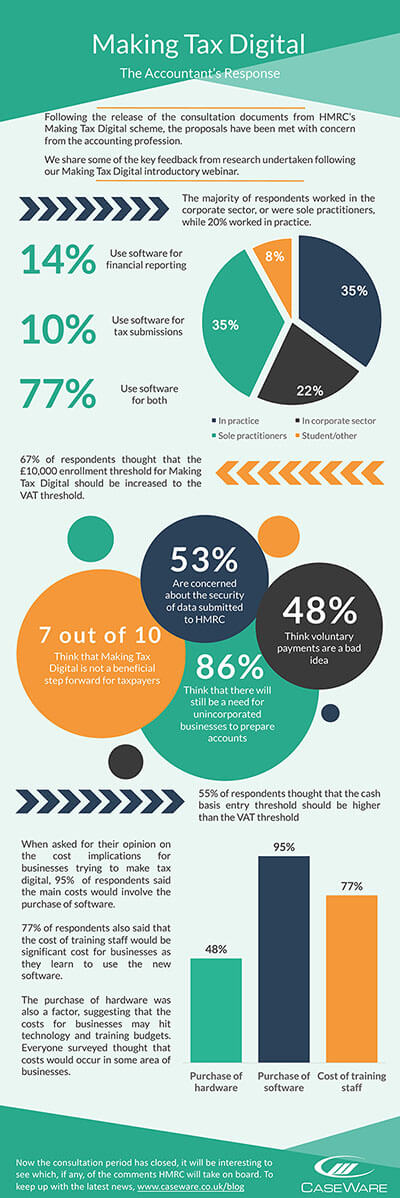Since the consultation documents were released for HMRC’s Making Tax Digital (MTD) in August, the proposals have been met with unease among accounting professionals.
An extensive consultation period has been underway with highlights from the six consultation documents have been under scrutiny, including exemption of landlords and businesses with a turnover of £10,000 from quarterly reporting and digital tax reporting.
As the consultation period has come to a close, we share some of the key feedback from research undertaken following our Making Tax Digital introductory webinar that has informed our response to HMRC on the proposals.
A broad mix of accountants took part in the survey, all already using some form of software for their reporting:
- Accountants in practice: 35%
- Accountants in the corporate sector: 22%
- Sole practitioners: 35%
- Student/Other: 8%
Even before the documents were released there was speculation and concern among accountants that the move to digital tax reporting by 2020 could be too tight a timeline to be implemented effectively. Having had the opportunity to view the consultation documents in more detail, seven out of ten (71%) of respondents in our survey thought that the plans were not a beneficial step forward for taxpayers.
The reasons behind this include anxiety around ‘reporting for the sake of reporting’ for small businesses and the extra administration demands. Instead of focusing on growth and day to day activities, SMEs will be consumed with the additional financial burden created by MTD. The £10,000 exemption threshold has been criticised for being too low, and more than six out of ten respondents (67%) agreed that if a business had a turnover below the VAT threshold it should be exempt from making tax digital.
Not only would there be cost of business hours spent on more frequent financial reporting, but 95% of accountants in our research said that they expected the area that will cause the biggest concern with regard to costs would be purchasing software.
While HMRC has stated that there will be free software for SMEs with simple tax affairs, there has been no confirmation on which software providers will be offering this, or how simple tax affairs will be classified. Over three quarters of respondents (77%) expected training costs for new systems to be another financial burden.
Another pressing issue for accountants is the security around the data being submitted to HMRC on a more regular basis. Over half of the respondents (53%) revealed that they had concerns about the security of providing data to HMRC. Although HMRC maintains that its IT systems have never been breached, it revealed that there were over 17,000 third party breaches in 2015, and a survey from the National Audit Office (NAO) in September condemned HMRC for 6,000 personal data breaches in one year.
The subject of ‘pay as you go’ voluntary tax payments was also suggested in the consultation documents and this has been met with a mixed response by the accounting profession, with 52% of those surveyed agreeing that it would be a good idea, compared to 48% who responded ‘no’.
Following the closure of the consultation period, it is expected that the main roadmap for Making Tax Digital will remain the same, so it is important to understand what firms can do to prepare clients to adapt to digital reporting.
Our infographic below details a visual breakdown of the key highlights and other engaging opinion and insight from the research.


